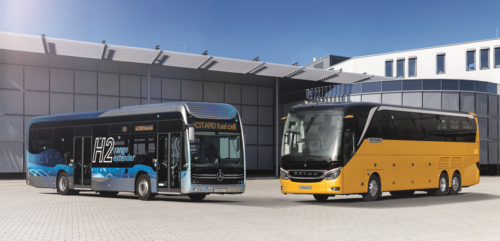
GERMANY
Daimler Buses has set itself what it says are ambitious goals for the future as part of its plans to expand on its position in the market by 2030. The manufacturer says it is aiming to achieve an adjusted return on sales of 9% by the end of the decade, assuming favourable market conditions, and expects to reach 8% by as early as 2025.
The company has laid out its plans to become more profitable in what it calls a a less than ideal market environment and to strengthen its competitiveness over the long term. Alongside ongoing expansion of its e-portfolio, the company is planning to align its offering of services even more closely to changing customer needs as well as to drive forward the digitalisation of products and processes to create further added value for customers and to boost efficiency within the company.
CEO Till Oberwörder said at an event held in Madrid: “The transformation of our industry is in full swing and demand for environmentally friendly means of transport is increasing continuously. We can make the world more sustainable with locally CO2-neutral buses and thus make an important contribution to mitigating climate change. We are firmly convinced that this is the ‘decade of the bus.’ We intend to make the best possible use of the opportunities opening up and, from a position of strength, make our mark on the transformation with our products and services like no other.”
In the bus market, where it says there is an increasing focus on zero-emission vehicles, Daimler expects demand for public transport to increase by a total of around 10% in Europe and Latin America by 2030 compared to 2019 levels.
Daimler Buses says it is consistently pursuing a clear e-roadmap across all of its market segments, with electrically-powered city buses in series production since 2018, and intercity e buses expected by the middle of the decade, with electrified coaches by 2030. The manufacturer also intends to generate a significant contribution to the company’s profitability through its product development, and plans for e buses to increasingly share their e-drivetrain, components and technologies, wherever possible, with the electrically powered trucks of the Daimler Truck Group.
Daimler Buses sold some 26,200 units around the world in 2023, significantly up on the prior-year level by around 9%. It ascribes the increase in sales as mainly due to a recovery in the European coach market, which led to a 26% increase in sales in Europe, to around 8,000 vehicles.

